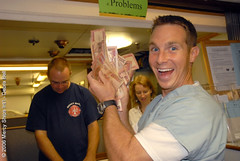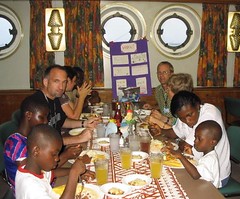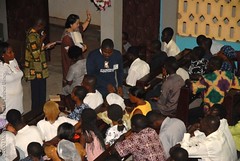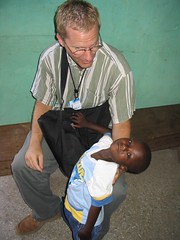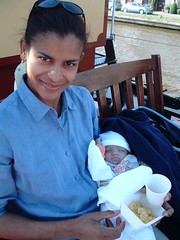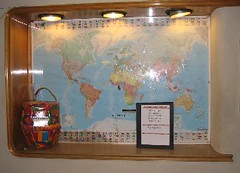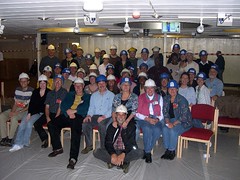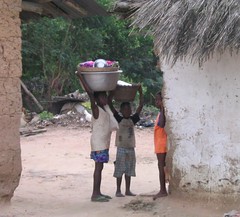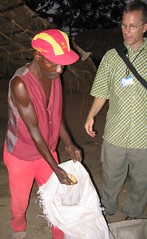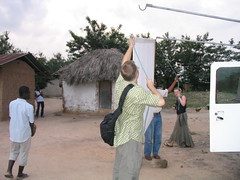Yes some people really get excited when they go to the ship’s crew bank – which is open on Monday mornings and Thursday evenings before our Community Meeting. Here is Ghana they use ‘cedis’ and it takes 9,160 of them to equal US $1 – so this is country where you can be a millionaire – only takes US $109.17 to obtain ONE MILLION CEDIS. The excited man is Dr. Keith who serves as our dentist.
Category Archives: Uncategorized
Wofa’s Family Visit
Wofa is the house dad and administrator at the Save Them Young orphanage where I have been going since June. Currently the home is one of our regular mercy ministry projects. Last night, the Kronester family and myself hosted Wofa, his wife Alice and their three children on board. We had tacos in our Pacific Dining Room.
HIV/AIDS Teaching
Our HIV/AIDS program uses a three-phase approach which will be implemented in Tema and Ashaiman.
• Phase I – Sensitize/De-stigmatize – five, one-day sensitizing workshops (one per month) for faith community using the ‘Starting Over’ movie and training tool by Gospel Communications International as the basis for planned discussions.
• Phase II – Strategize – five, two-day capacity building workshops (one per month) for church volunteers to learn care and support program planning and design.
• Phase III – Empower – five, two-day training workshops (one per month) that will provide training in each city in the following areas: one palliative care work shop, one foster care of OVC workshop, one prevention and peer counseling workshop. Training tools are also provided such as prevention movies, peer counseling interactive CD’s and a comprehensive life skills prevention curriculum.
I have gone out with the team as we continue to work with the local church and this important issue.
Mohammed looking at the camera
Little Mohammed was brought to the Save Them Young Orphanage about 7 months ago. His father was not able to take care of him alone. He has polio. Save Them Young Orphanage is one of our mercy ministry sites and one that I have been involved with since June, my first month in Ghana. We took him today to pick up some braces that will help him to learn to walk. He couldn’t resist looking up at the camera!!
Tuinier’s baby Isabella Oct 06
My friend Elizabeth from the Dominican Republic and her daughter Isabella, husband Jan is not in the picture, probably because he took the picture. She had major complications at birth, though she is doing much better. They will be rejoining the crew of the Africa Mercy in January and soon we will see them here in West Africa.
Opportunities Binder
In Programs here on the m/v Anastasis, we have many different things going on. With permission from the council on board, I created an Opportunities Binder that is located near to the gangway. Inside there are many sign up sheets on what the crew can be involved with – from visits to orphanages, hospice, psychiatric hospital to helping on Saturday at the construction site. I am hosting groups on Wednesday to take them to 4-5 of the off-ship ministry sites – so for those on the ship, they can see for themselves what is happening in the various locations. There are other opportunities to sign up to share your testimony with the patients and to adopt-a-patient who will be in our wards.
AFM Crew
Our friends on the Africa Mercy up in northeast England celebrated as they met together to have their community meeting on board the vessel itself – this was a special event, regular meetings will start once they all move to live on board in December. Here is a photo that a friend sent to me of them. They are still in the shipyard and thus need to have their steel-toe boots, helmets and glasses on. We are planning to move out of shipyard next month.
Carrying goods on their heads start early
As I walk around town and in the countryside, I am amazed at the variety of different things that the African carry on their heads – from a simple platter with peeled oranges to sewing machines and tables. They learn while they are young and get such balance. Some use a cloth on their head to help with the balance, but others without. I can’t balance a book on my head and walk any distance.
Rice Farming Man
During a visit to a more remote village one evening, I was met by Richard and here he is telling me of all the types of rice, harvesting and marketing. I guess I really never thought about the different types of rice or their nutrition value – they have one here called ‘red rice’ and it is much higher in nutrients than most of the others.
Movie time in the village
One of our programs to aid women and getting them started in their own micro-enterprise (small business) is beekeeping. We are in partnership with the Ghana Forestry department and have 52 women enrolled in the program. Though for the Africans and my former neighbors in Indiana, bees can be scary and fear of being stung. So as part of the program, we visit each of the women’s communities as a form of follow up to see her set up and then for the entire community we show a film on bees so that they understand better and are more welcoming to bees and the woman’s business – in the photo I am setting up the screen. This has really ministered to these women and will allow them a way to earn money without much time invested everyday so not to take them away from their families.

